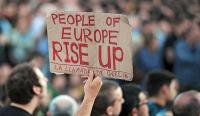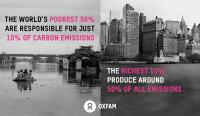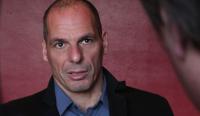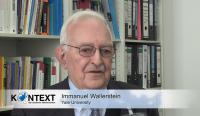“Speaking of ‘climate change’ is like calling an invading army ‘unexpected visitors’”, according to George Monbiot. We are not facing slow gradual change, but rapid disruptions of highly complex natural systems. Industrial agriculture is destroying biodiversity, soils and fresh water resources even faster than climate breakdown. According to the UN, only 60 years of harvests remain globally, if agriculture continues on this destructive path. Especially worrying is the fact, that the pollination of crops like rice and maize could be inhibited due to global warming, as these plants only pollinate at night below certain temperatures. The biggest factor for environmental disruption is meat production: pastures and grain-production for meat are responsible for the massive destruction of wetlands and forests worldwide, including the Amazon. At the same time, industrial fishing is already causing “cascading ecological collapse” in the seas.
George Monbiot, columnist with the Guardian und author of Heat: How to Stop the Planet Burning and Out of the Wreckage. A New Politics for an Age of Crisis
Fabian Scheidler: When it comes to the crisis of life on earth you speak of the possibility of climate breakdown and more generally also of environmental breakdown in contrast to just gradual changes. What do you mean by breakdown?
George Monbiot: Well, breakdown I think is a far better description of what we face than climate change which doesn’t actually tell us very much at all, I mean calling it climate change is like calling an invading army unexpected visitors. It’s such a ridiculously neutral and passive term for this existential threat we face. The earth’s systems are highly complex and complex systems do not respond to change in linear and gradual ways they tend to absorb and absorb pressure and then suddenly you get a sudden rupture where you move from one stable state to a new stable state which can be radically different from the first stable state. And when you look at the earth’s systems, it’s not just one complex system, it’s a whole series of complex systems interacting. Atmosphere, oceans, land surface, soils. The biotic environment, in other words all the animals and plants, and many others besides. They don’t sit within their boxes - those complex systems react with each other, respond to each other, react to each other and so when one starts to flip from one state to another, it will cause others to flip as well. We don't know whether tipping points are we won't know until we passed them. We can make some guesses, but they are no more than guesses. By the time we know it'll be too late to change them and there is a danger, a very real danger that we flip from what is fundamentally a habitable state to an uninhabitable state. Even if the change were gradual and linear, it would still be phenomenally dangerous. If you look at the difference between now and the last ice age, it’s 4° average global temperature. Talking about an extra 4° by the end of the century which would turn us into a radically different climatic state to the one that we have today. But that's assuming that it just steadily turns to that that. But the massive disruptions you can get as this complex system tries to adapt to the pressures being pushed into it could mean that we get very sudden changes indeed. Which can radically change whether or not we can continue to live in the places where we live today.
Fabian Scheidler: Can you give an example of such an abrupt disruption?
George Monbiot: We’ve already seen, for example, in parts of both the US and Europe this last summer massive wildfires of the kind that were predicted maybe for the middle of the century. But you get this runaway process where soil moisture loss is encouraged through global heating which leads to the desiccation of vegetation which then isn't producing rain clouds and the rest of it. You can get these runaway processes and suddenly ‘whoop’ – the whole lot goes up. Storm surges. Similarly, you can have a situation where for instance salt marshes and mangroves are being destroyed by people turning them into prawn-farms or whatever it might be. So one kind of environmental change. You get far more energy in the oceanic system that’s caused by heating and that leads to storms. Leads to storm surges. You no longer have the coastal protection and suddenly large areas of coastal land are under water and you’ve lost your livelihood. We already saw last year some massive storm surges with hurricanes making landfall in places in the US where they’d never hit so hard before and many other parts of the world, particularly in South Asia, were hit very hard indeed. But this is just the beginning. This is 1° of warming. This is nothing to what we anticipate later in the century.
Fabian Scheidler: A key factor in environmental destruction is industrial agriculture. You have written extensively about it. In Germany a recent study found that insects have declined 76% in just 27 years in Germany. Even a new word has been created for this type of extinction: insectageddon. Can you talk about the way industrial farming and industrial livestock farming are contributing to the destruction of the climate and soils and freshwater resources.
George Monbiot: This is the issue that keeps me awake at night. Brexit doesn’t keep me awake at night; Donald Trump doesn’t keep me awake at night. It’s not that I don’t care. I’m already bloody awake, because I’m fretting about the food supply and fretting about all the impacts that supplying that food creates. I mean, you might be aware of this famous statistic from the UN Food and Agricultural Organization that at current rates of soil loss we have 60 years of harvests left. We see a massive depletion of groundwater taking place; we see a collapse of pollination, not just because the insects are disappearing, but also because wind-pollinated crops, such as rice and maize – beyond a certain temperature the pollination occurs at night, the pollination is inhibited. And we have no idea how they’re going to respond, but it could be a very severe response indeed. An extra degree or so of heating at night could pretty well stop pollination occurring in many of the world’s key bread baskets. At the same time, we have a growing population, but much more importantly than any of that is we have a growing population switching towards meat eating. And at the moment we’re already seeing a quadrupling in meat consumption in the past 50 years. But even so, global average consumption of meat is half that of countries like Germany and the UK. And one third that of the US, so potentially there’s a long way to go. Now, meat eating is a tremendously inefficient way of using land. You need far more land if you’ve got a meat-based than if you’ve got a plant-based diet. Massively more land. And that applies whether you’re talking about grain-fed meat or pasture-fed meat, which is even more inefficient than grain-fed meat and all the land being taken for pasture, taken from tropical forests, drained wetlands, and the rest of it, is land which was previously rich ecosystems, could be rich ecosystems again if it weren’t for meat production, whereas the animals fed on grain are taking grain out of the mouths of human beings. 53% of all the plant protein now grown is fed to animals instead of fed to people and a huge amount of that is lost before the animals are then fed to people, because it’s highly inefficient to put it through an animal first. And the result of this is a global land hunger – a global hunger for irrigation water, a global hunger for fertilizer. And we’re already exceeding the planetary boundary for natural fertilizer by a factor of two and it’s likely to get much worse. And a massive assault on the world’s ecosystems. Meat eating is by far and away the biggest impact on biodiversity and abundance on earth. That’s on the terrestrial side, then at sea by far and away the biggest impactor on marine ecosystems is eating fish. We get very exercised about plastic, and plastic waste in the sea is a terrible thing. It’s not nearly as bad as industrial fishing, which is causing cascading ecological collapse across ecosystems right around the planet, really shocking, horrible stuff that’s happening and massive bycatch, massive overfishing, and yet we don’t seem to care about it. It’s not an issue that intrudes upon us. So these are the really huge impacts, bigger even than climate breakdown – or rather it’s happening faster than climate breakdown. The biological annihilation driven primarily by the food industry, and so what we urgently need to do is switch to a plant-based diet. That’s the biggest intervention you can make. Then we can also start looking at how we grow those plants. We need to do that in very different ways. There’s lots of different ways of doing it, but the key thing, absolutely crucial for both human survival and the survival of the rest of the living planet, is just not to eat animal products anymore.
Fabian Scheidler: But is it just consumer choice or is it rather a political choice also how we subsidize industries? What would have to change on the political side to change agriculture on a global scale?
George Monbiot: It has to be said that this is one of the few areas where consumer decisions actually make a major difference, because it’s very easy to decide whether you’re eating animal products or whether you’re eating plant products. Whereas if you go to the shops and you look at two different kinds of plastic – which is the ethical one and which isn’t – it’s almost impossible to decide. There’s going to be perverse consequences no matter which decision you make. However, we become far more powerful when we’re making consumer choices if it’s embedded within political choices. And where governments are actually governing, which is of course what the billionaires don’t want them to do. So we need to be active citizens, we need to demand political change, and we need to see, yes, an end to the subsidization of meat production. We need radical reforms to the common agricultural policy in Europe and to other such policies around the world. I mean, at the moment the common agricultural policy pays people by the hectare, which creates this huge perverse incentive to clear land to bring it into the agriculture envelope even if you’re not actually using it. I’ve seen this in Romania, where many tens of thousands of hectares of really beautiful habitat have been destroyed just in order to claim subsidies, because you can only claim subsidies for land which is supposed to be in agricultural condition, have no permanent ineligible features on it, which means wildlife habitats. So you have to clear all that habitat and then you say, look it’s in agricultural condition. “Are you producing anything on it?” “Well, there’s a couple of sheep. We’re not really producing anything.” “Oh, that’s fine, it doesn’t matter, as long as it’s in agricultural condition.” Because the best way of maintaining it in agricultural condition is to put grazing animals on it. It’s totally perverse. 55 billion Euros a year we’re paying to trash the habitats of Europe. Why? It’s madness. Utter madness. It has to change.
Fabian Scheidler: How does meat production and consumption relate to what is happening in the Amazon and now with the Brazilian president Jair Bolsonaro, where many environmentalists fear that he will cut down the Amazon even much faster than before. So it’s easy to blame the Brazilian government, but how does it relate to our own system here?
George Monbiot: Well, the two major impacts on habitats in Brazil are cattle ranching and soya production to feed to animals. Because 90-something percent of all the soya grown in Brazil and Argentina goes into animal feed. In fact, to the extent that if you want to eat less soya, you should eat soya, because there’s less soya embedded in a block of tofu than there is in a slab of meat, because of all the soya that is fed inefficiently to animals. You could cut down the soya production in South America by 90% if you switched to a plant-based diet. So, yes, of course it’s these huge forces, but there’s also politics involved, in that cattle ranching and the Amazon – it makes no economic sense, but there is a massive demand by very powerful land owners to be allowed to carry on cutting down trees and transforming them into cattle pasture, which is really above all else speculative collateral. The land, once you cut down the trees and put a fence around it, you can then say this is my land, I have legal title to it, and then you can use that as collateral for other businesses, including for drug deals and all sorts of other dodgy stuff going on in Brazil, as I’ve seen myself. And so what you’re really doing is creating enormous share certificates out of land, you’re just creating equity. That’s what’s really driving it. Now, the congressional ranchers’ forum, the congressional beef caucus, as it’s called in Brazil, has effectively been put in charge of agricultural policy and of policy relating to the Amazon. So all the biological reserves, the indigenous reserves, they’re all now at risk. A whole forest is at risk. And that has potentially devastating consequences for the rest of the world.





